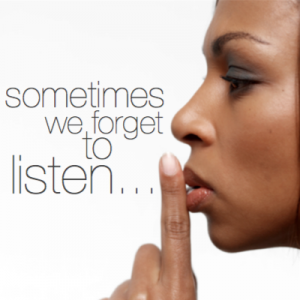Engaging with our culture
Yesterday, we saw how in Daniel 2, Daniel acted as a channel of God’s wisdom and power by recounting and interpreting King Nebuchadnezzar’s dream for him.
 In Stretch, the book I’m reading at the moment, Gerard Kelly has a different (but related) take on the whole episode. He sees it as being all about listening.
In Stretch, the book I’m reading at the moment, Gerard Kelly has a different (but related) take on the whole episode. He sees it as being all about listening.
Daniel has been preparing himself for this encounter by training diligently and doing his best in all that has been required of him. Not knowing that this encounter would be the outcome, but being faithful in the small things, so that he’s ready for the big things. He’s living out his faith in everything he does. He’s practising the presence of God at all times. He’s always listening, always open, always desiring to apply God’s word to every situation.
He’s immersed himself in Babylonian culture without becoming assimilated. He’s watched and listened and taken it all in. He’s begun to work out what makes the Babylonians tick, what they care about, how they think.
He catches the rhythms of the city. Page 49, Stretch
Prophecy is never one-sided. It is a bridge between two worlds. And a prophet has to stand with a foot in each world. He has to listen to God to receive what God wants to say to the people. He has to listen to the culture of the people to be able to know how to convey what God has to say in an accessible and relevant way. In a sense, he has to earn the right to speak to the people by immersing himself in their culture, living among them, listening to their desires and values and needs. Then he is powerfully speaking God’s word into a situation that he has already grasped.
In the same way, the church is to stand for God to the world and stand for the world to God. The church is to listen to God and convey His truths to the world. And the church has to listen to the world and convey the cry of its heart to God. The church has an awful lot to learn from the example Daniel sets.
Daniel has won the trust of the Babylonians by the way in which he has lived among them. He has come to care about them as he has listened to them. Love begins with listening. And they have seen this in his attitude and faithful service.
Daniel is not bringing a new version of God to suit the Babylonians. It’s the same ancient story. God is unchanging. But he finds fresh and relevant ways to convey that ancient story without losing any of its truths.He finds points of contact that the Babylonians will understand and relate to. Interpreting dreams was a massive deal to the Babylonians. So this is where Daniel starts to introduce his God to these people.
Gerard Kelly describes this as an ancient-future faith. What a great phrase!
a faith that is true both to the ‘oldness’ of God’s story and to the ‘newness’ of this context. Page 54, Stretch
And so we are called to be constantly finding fresh ways to bring God’s kingdom to our ever-changing culture.
double-listening prophets who will earth the glories of heaven in their specific time and place. Page 59, Stretch
How is your faith carrying you through whatever Babylon you are living in right now?
How are you managing to immerse yourself in the culture without being assimilated into it?
How are you meeting and talking to and doing business with every individual you encounter?
How good are you at listening before judging?
How are you taking the time to look and listen, to really understand the culture you’re living in?
Our listening should be born out of genuine engagement with culture and a genuine fascination with people: nothing less will be pure or strong enough to build a platform for our gospel. Page 63, Stretch












